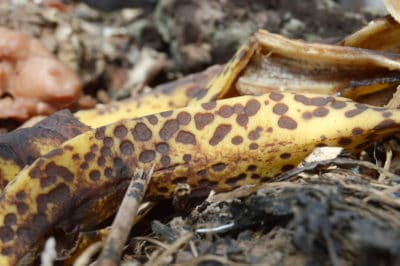Can I Grow Bananas?
The edible grocery store banana is a tropical plant with a relatively limited range. However, many other bananas and the cooking version known as plantains can be grown in USDA Zones 8 through 12. While some are purely grown for the ornamental value of their leaves, others will produce edible bananas of varying size and flavor – all of which have peels.
Why Do Banana Have Peels?
Like many fruits, the interior of a banana is soft. As the fruit ripens, it becomes sweeter due to the acculturation of sugars. The peel protects the soft interior from rot due to rain or bacterial infections. It also prevents insects and birds from eating the tasty interior. The peel also indicates ripeness – peels change from green to yellow and then develop brown spots.
What Nutrients are Contained In Banana Peels?
Banana peels have a surprising array of valuable nutrients for something that is typically considered disposable. Among these are:
- Minerals such as potassium, sodium, phosphorus, calcium, magnesium, sulfur
- Vitamin B 6 and vitamin B 12
- Fiber
- Protein
- Polyphenols, carotenoids and other bioactive compounds.
How Do I Make Compost?
A compost heap is a combination of high carbon and high nitrogen materials. Any organic material can be used: grass clippings, spoiled hay, vegetable and fruit trimmings and cores, manure and wood chips. The pile is built in alternating layers, kept moist and allowed to “work.” Turning with a pitchfork every few weeks speeds up the decomposition process.
Can I Just Toss the Peel In My Compost Pile?
Like other organic material, bananas will break down if simply tossed in the compost heap. It’s a fairly slow process, however. A whole banana peel make take anywhere from a month to a year or more to break down into usable compost. Whole peels are also more likely to attract insects and animals like mice.
Can I Bury the Peel in the Garden?
As with tossing the whole peel into the compost heap, burying a peel in the garden means it takes longer to break down. A compost heap is typically turned regularly, as the aeration of the pile helps speed tissue breakdown. In addition, putting the whole peel in the garden may steal valuable nutrients from plants as soil microbes use the nutrients to break down the peel.
How Do I Prepare Banana Peels for Composting?
A chopped banana peel will break down more quickly. The smaller the pieces, the faster it will become compost. You can cut the peel into pieces with a sharp knife or chop the peel with a mezzaluna tool. Another option is to cut off the hard stem end, cut the peel in thirds or quarters and process in the food processor with a little water.
How Do I Add Banana Peels to Compost?
Once you’ve prepared the banana peels, take them out to the compost heap and mix them in. Mixing achieves two purposes. First, it brings the pieces of peel into contact with the microbial population in the compost heap – which starts the decomposition process. Second, it helps aerate the compost heap, which supplies oxygen to sped the decomposition process.
How Do I Manage the Compost Heap?
While material in a compost heap will always break down eventually, a well-managed heap produces compost more quickly. Keep the pile watered – you want it to be about as wet as a sponge you have just wrung out. Turn the heap with a pitchfork at least once a week; every two or three days is even better if you can manage it.
What About Diseases?
Compost heaps are loaded with bacteria, which is a good thing. Those tiny organisms are what break down plant materials into compost. The heat of a compost pile is enough to kill most pathogenic – disease-causing – bacteria and any plant diseases that might be on the raw materials. However, you should wash your hands after handling compost.
